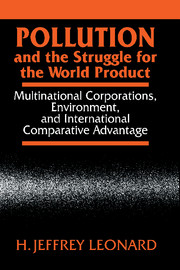 Pollution and the Struggle for the World Product
Pollution and the Struggle for the World Product Published online by Cambridge University Press: 05 January 2012
Like most political-economic upheavals in modern history, the industrial revolution did not originate in the plans and designs made by governments. Rather, it became the dominant force shaping world politics and economics in the nineteenth and twentieth centuries on the strength of a long series of spontaneous inventions and innovations by private entrepreneurs in Europe (especially Great Britain) and the United States. To be sure, governmental actions in Great Britain and later the United States greatly facilitated innovation, the introduction of new technology and production techniques, and the raising of capital for investment. Governmental encouragement, though perhaps necessary for the industrial age to flourish, did not cause its birth. The original will to industrialize was a spark that inflamed the hearts and minds of individual entrepreneurs and subsequently molded sympathetic political constituencies within the state.
Since then, however – especially in the twentieth century – the state has become more and more directly involved in formulating the strategy, creating the spark, and even owning the capital in all countries that have sought to attain the affluence and power associated with industrialization. One reason for this, as Gerschenkron stressed, is that the advancement of several countries perforce fundamentally alters the challenge of industrialization for all others.
To save this book to your Kindle, first ensure [email protected] is added to your Approved Personal Document E-mail List under your Personal Document Settings on the Manage Your Content and Devices page of your Amazon account. Then enter the ‘name’ part of your Kindle email address below. Find out more about saving to your Kindle.
Note you can select to save to either the @free.kindle.com or @kindle.com variations. ‘@free.kindle.com’ emails are free but can only be saved to your device when it is connected to wi-fi. ‘@kindle.com’ emails can be delivered even when you are not connected to wi-fi, but note that service fees apply.
Find out more about the Kindle Personal Document Service.
To save content items to your account, please confirm that you agree to abide by our usage policies. If this is the first time you use this feature, you will be asked to authorise Cambridge Core to connect with your account. Find out more about saving content to Dropbox.
To save content items to your account, please confirm that you agree to abide by our usage policies. If this is the first time you use this feature, you will be asked to authorise Cambridge Core to connect with your account. Find out more about saving content to Google Drive.